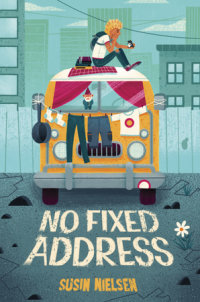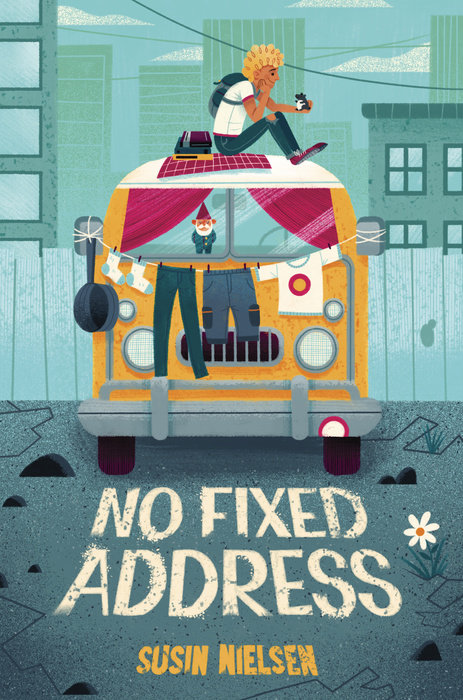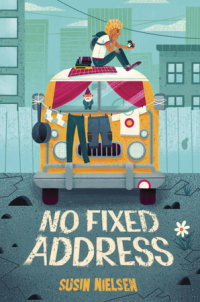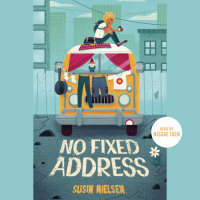No Fixed Address
For fans of Wendelin van Draanen and Cynthia Lord, a touching and funny middle-grade story about family, friendship, and growing up when you're one step away from homelessness.
Twelve-and-three-quarter-year-old Felix Knutsson has a knack for trivia. His favorite game show is Who What Where When; he even named his gerbil after the host. Felix's mom, Astrid, is loving but can't seem to hold on to a job. So when they get evicted from their latest shabby apartment, they have to move into a van. Astrid swears him to secrecy; he can't tell anyone about their living arrangement, not even Dylan and Winnie, his best friends at his new school. If he does, she warns him, he'll be taken away from her and put in foster care.
As their circumstances go from bad to worse, Felix gets a chance to audition for a junior edition of Who What Where When, and he's determined to earn a spot on the show. Winning the cash prize could make everything okay again. But things don't turn out the way he expects. . . .
Susin Nielsen deftly combines humor, heartbreak, and hope in this moving story about people who slip through the cracks in society, and about the power of friendship and community to make all the difference.
An Excerpt fromNo Fixed Address
November 27, 12:05 a.m.
My leg jiggled up and down. I shifted from one bum cheek to the other. My palms felt damp and my heart was pounding. “I’ve never been interrogated before.”
“You’re not being interrogated, Felix. We’re just having a chat.”
“Are you going to record it?”
“Why would I do that?”
“It’s how they do it on TV.”
“We’re not on TV.”
The cold from the metal chair seeped through my pajama bottoms. “Do cops watch cop shows?”
“Of course.”
“But isn’t that like bringing your work home with you?”
Constable Lee smiled. Her teeth were very straight. My Powers of Observation, or P.O.O., told me that she came from a middle-class family, one that could afford an orthodontist. My P.O.O. also told me she enjoyed her food: the buttons on her uniform were strained to the max. “Not really,” she answered. “It’s escapism for us, too. And we get to shout at the TV if they do something totally bogus.”
“Like what?”
“Like record this type of conversation. We only record a conversation if someone has been charged with a crime, or is a suspect in a crime.”
“Are you recording Astrid right now?”
“I can’t answer that.”
Oh boy. I hardly ever cry, but all of a sudden I thought I might burst into tears, right in front of a cop. I think she could tell, because she added, “I highly doubt it.”
I breathed in. I breathed out. I sat up straight. I tried to look calm and dignified even though I knew my blond curls were sticking out in all directions, because until everything went so terribly wrong I’d been in bed. Plus I was wearing my ancient Minions pajamas, which were juvenile and way too small. Constable Lee and her partner hadn’t given us time to change. “I’d like to call my lawyer,” I said.
“Let me guess--you got that from TV, too.”
“Yes.”
“Do you have a lawyer?”
“No. But legally I’m allowed one, right?”
“Except you don’t need one. You haven’t done anything wrong.”
“So I could just leave?”
“I suppose. But where would you go?”
I thought about Dylan. And Winnie. Then I remembered that I’d told them I never wanted to see them again. “When will they be done talking to Astrid?”
“Soon, I’m sure.” She stared at me, clicking her pen, open, shut, open, shut. “Mind if I ask why you don’t call her Mom?”
“She says it’s too hierarchical.” I scanned the huge room, full of desks and a handful of people, for the hundredth time. For the hundredth time, I didn’t spot Astrid.
It’ll be okay, I thought-messaged her, because she’s always telling me she’ll receive anything I send her. I don’t believe that anymore, but under the circumstances, it was worth a shot. “For the record,” I said to Constable Lee, “Astrid is a great parent.”
“Good to know.” She tapped on her keyboard. “I’m going to ask you a few questions, okay?”
“Okay.”
“Let’s start with your full name.”
“Felix Fredrik Knutsson.”
She typed it into her computer. “Age?”
“Thirteen. Well, almost. Twelve and three-quarters.”
“Mom’s full name?”
“Astrid Anna Knutsson.”
“Address?”
I looked down at my feet. I wore my rubber boots, no socks; there hadn’t been time to search for a pair.
Constable Lee leaned toward me. Her shoulders were rounded. She did not have good posture. “When we answered your call tonight, Felix, it did appear as if you were both living there.”
Oh, how I longed for my mom. She would have a plausible-sounding explanation. But I’m not like her. I’m not a natural-born stretcher of the truth.
So I continued to stare at the floor.
Constable Lee started typing, even though I hadn’t said a word.
“Felix,” she said gently, “you can talk to me. . . .”
“I’m hungry.”
“Of course. I should have asked.” She pushed herself up from her desk and hitched her pants up around her belly. “We’re talking vending machine snacks. Hope that’s okay. Any allergies? Any preferences?”
“No allergies. No preferences. Although I am partial to anything cheese-flavored.”
Constable Lee walked across the big room. I glanced around. A couple of cops were at their desks. One was reading Popular Mechanics and another was dozing.
I swiveled Constable Lee’s computer screen toward me.
It was an official-looking report.
Name: Felix Fredrik Knutsson
Age: 12
Parent/Guardian: Astrid Anna Knutsson
Address: NFA
I’m pretty good at figuring out acronyms, and this one, given the context, came to me almost right away.
No fixed address.
I felt a ripple of dread. Astrid had warned me over and over: “No one can find out where we live.” Until tonight, I’d broken the rule only once.
Our cover was blown. I tried to tell myself it wasn’t my fault. I’d had no choice; I had to call the cops. If I hadn’t, who knows what would have happened?
Still. The bad guys got away. And who was at the police station? The innocent victims. Us.
Two bags of Cheezies landed on the desk in front of me, along with a can of Coke. “Aren’t we a nosy parker,” Constable Lee said as she swiveled the computer screen back.
“No one can agree on the origin of that expression,” I said. “Some people think it came from an archbishop in the fifteen hundreds named Parker, who asked too many questions. Other people think that’s hooey, since the phrase didn’t appear till the end of the nineteenth century.” I knew I was rambling, but I couldn’t help it.
“You are a font of knowledge.”
“My mom says I store facts like a squirrel stores nuts.”
Constable Lee tore open a bag of chips and popped one into her mouth. “Now. You have to believe me when I say I’m here to help.”
I wanted to believe her. But I kept thinking of my mom, who snorted like a pig whenever a police car drove past. Who liked to say “Never trust the Man.”
“Which man?” I’d asked when I was younger.
“The Man. It’s an expression. It means any man or woman who’s in a position of authority.”
So all I said to Constable Lee was “Thanks. But we don’t need any help.”
“Really?”
“Really. We’ll be moving very soon.”
“Yeah? Where?”
“I don’t know yet. But I’m coming into some money. The only question is how much.”
“An inheritance?”
“No.”
“Selling some valuables?”
“No.”
“Robbing a bank?”
“Very funny. No.”
“So where’s this money coming from?”
“A game show.”
“Well, now I’m intrigued. Tell me more.”
“About the show?”
Constable Lee put her feet up on her desk. “About everything.”
I studied her face. My P.O.O. told me she was a decent person. Maybe if she knew the truth, she would see that we’d done nothing wrong.
So I poured a bunch of Cheezies down my throat.
Then I told Constable Lee the whole truth and nothing but.



